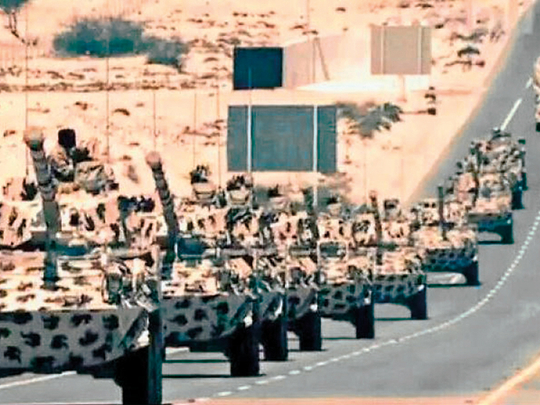
Al Mukalla: Yemeni government troops seized control of Al Bareh town and neighbouring mountains west of the city of Taiz after heavy clashes with the Iran-backed Al Houthis, Yemen’s Defence Ministry said on Tuesday night.
The Al Amalika Brigades—led by Tariq Mohammad Abdullah Saleh, the nephew of assassinated former Yemeni leader Ali Abdullah Saleh and the Tehami resistance—played a major role in the success of the operation.
Shortly after announcing the town’s Al Bareh, Saleh’s forces issued a statement saying they would pause advances in Al Bareh and head northward towards the port city of Hodeida where they would wait to receive orders to advance from their commanders.
The end goal of the current government offensive on the Red Sea coast is to reach Hodeida, the last major port city under Al Houthi occupation, where they receive arms smuggled in from Iran.
Military experts say that government forces should not face stiff resistance in the march to Hodeida after the liberation of Al Bareh because Al Houthis would be unable to send reinforcements from the mountains after the roads were cut off.
According to the official Emirati news agency WAM, the forces have finalised preparations for a large-scale military operation to liberate Hodeida.
There will be a joint operations room, run by the Saudi-led Arab Coalition including UAE armed forces, which will coordinate the offensive.
Compromised by forces from government forces launched a joint offensive on Tuesday on Al Bareh after seizing control of strategic roads and mountains that overlook the town.
The forces stormed the city, forcing Al Houthis into surrendering or fleeing to mountainous areas in Taiz.
Al Bareh, a strategic city west of Taiz, was the target of an offensive that began in April when elite forces that defected from Al Houthis marched towards the town from their government-controlled military camp in the town of Mokha town on the Red Sea coast.
Supported by UAE airpower and military logistics, the forces seized control of a strategic intersection on the main road linking Taiz on the east to the port city of Hodeida on the west and then advanced further and took control of another intersection outside Al Bareh, cutting off supply arms and isolating Al Houthi pockets in neighbouring Kahboub, Al Ameri and other areas.
Local military officers hailed the victory in western Taiz, Yemen’s third largest city, saying the liberation of Al Bareh would mean lifting Al Houthi siege on Taiz from the west.
“This is a big blow to Al Houthis. Al Bareh is located in the middle of a network of roads that links different areas inside Taiz with coastal areas on the Red Sea,” Colonel Abdul Basit Al Baher, a spokesperson for Yemeni army in Taiz, told Gulf News by telephone, adding that arms and military supplies can flow now from liberated areas into the city downtown to reinforce government forces who have been battling Al Houthi siege and shelling for the last three years.
The Saudi-led Arab coalition entered the Yemeni war in 2015 just months after an Al Houthi coup forced internationally-recognised Yemeni president Abd Rabbo Mansour Hadi out of power.
He later was able to escape house arrest and flee to Aden where he temporarily shifted government headquarters.
Since then, the coalition has gained back 86 per cent of Yemeni territory but major population centres still remain under Al Houthi control.
Saudi Arabia and the US have accused Iran of illegally smuggling weapons into Yemen to sustain Al Houthi war efforts.
Thousands of missiles fired by Al Houthis have landed in Saudi territory.
In December, one such Iranian-made ballistic missile was fired towards Riyadh for the first time in the three-year war.
Although it was intercepted, Riyadh called it an ‘act of war’ and vowed a resolute response by a coordinated and intricate government offensive.
The latest government push seeks to take advantage of cracks in the awkward Al Houthi alliance with former Yemeni President Ali Abdullah Saleh’s supporters.
Saleh ruled Yemen for more than three decades until he was forced to resign following an Arab Spring uprising in 2011.
He remained in the country, however, and continued to wield power from behind the scenes.
In 2014, his forces allied with Al Houthi militia, despite the fact that as president he had gone to war with them.
There had been simmering tensions between the two awkward allies in past months that boiled over in December when Saleh suggested he would cooperate with Hadi — he was assassinated shortly after.
Since then senior members of Saleh’s party have either been executed or placed under house arrest by Al Houthis amid a draconian crackdown.
The broken alliance between Al Houthis and forces loyal to Saleh appears to be permanent, which will help the Yemeni government and its backers in the Saudi-led coalition weaken their grip on the country given the reduction in manpower.
On March 25, Al Houthis sent a salvo of seven missiles into Saudi Arabia yet again, killing one Egyptian expatriate in Riyadh.
Saudi Crown Prince Mohammad Bin Salman described the attacks as ‘desperate’ and an indication of Al Houthis’ growing political isolation.
Saudi Arabia, he said, is now seeking to end the war through a political process, trying to divide Al Houthis and maintaining military pressure on them.












